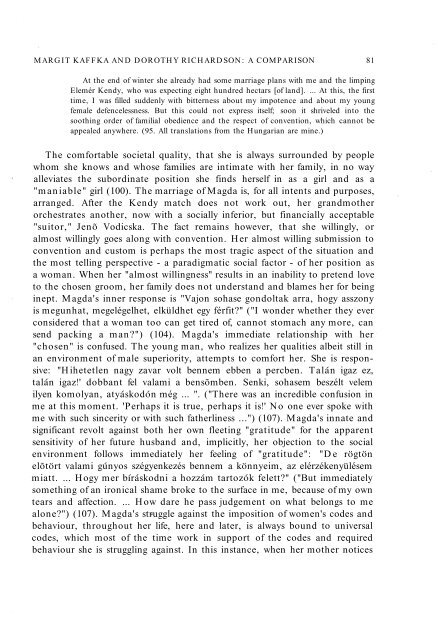80 STEVEN TÖTÖSY de ZEPETNEKThe comparison of Kaffka and Richardson can begin with their similarsocial and educational background. Both come from an impoverished gentryand upper-middle class background, respectively; both had a strict religious(Catholic and Protestant, respectively) upbringing, and both were teachers.Kaffka's experiences of marriage and the male's world were more laden withnegative experiences than those of Richardson. One interesting and tellingexample from Kaffka's life should serve here as a pointer. Endre Ady, the greatHungarian poet, is often mentioned as a friend of the young Kaffka. (This I taketo be a kind of legitimization of Kaffka's importance as a poet in her youngeryears.) It is the more telling that one of Kaffka's first encounters with Ady was adisaster, exactly because of the apparent manifestation of patriarchal values onthe part of Ady. On the occasion of a dinner party, Ady and Kaffka left togetherin a horse-drawn cab. Ady, who drank copiously during the dinner, madephysical advances towards the attractive young woman (nota bene, not thewriter, but the woman). Kaffka, who was interested in an exchange of ideas withthe prominent and admired (by her, too) poet, was obviously distraught anddisillusioned (qtd. Földes 89-90 from Dezső Szabó, Életeim).An important dissimilarity of Richardson and Kaffka is their span of lifeand, consequently, their literary output and literary maturity. However, as Iam concentrating on Richardson's early work and on Kaffka's prose writing,this dissimilarity becomes immaterial as the works considered all appearedbefore 1919, that is, shortly before and during the First World War. FromRichardson's works I have chosen the above-mentioned Pilgrimage trilogy andfrom Kaffka's works the novel Színek és évek (Colours and Years) (1912).To begin with Kaffka's Színek és évek, the novel is the story of MagdaPórtelky, the development of a woman in the gentry environment of demiseand decadence, where a woman's only choice is marriage (Szabolcsi 224-25),and resignation to patriarchal values in society. Magda's disillusionment withher life begins with the realization that the initial game of the sexes, the danceof conquest and submission (social and sexual), is disproportionate to theaftermath, the reality of female submission in marriage (78-79). The reigningsocial codes and the importance of material considerations are omnipresentand determining factors of a woman's defenceless and subordinate position insociety:A tél végén már volt valami házassági terve énvelem, s a sánta lábú KendyElemérrel, akire nyolcszáz hold néz.... Akkor először öntött el hirtelen valami keserűséga tehetetlen voltom, lányi kiszolgáltatottságom éreztén. De nem lelt kifejezést; visszafojtodott hamarosan a családi fegyelem és szokástisztelet megnyugtató, mert sehova nemfellebezhető rendjében. (95)
MARGIT KAFFKA AND DOROTHY RICHARDSON: A COMPARISON 81At the end of winter she already had some marriage plans with me and the limpingElemér Kendy, who was expecting eight hundred hectars [of land]. ... At this, the firsttime, I was filled suddenly with bitterness about my impotence and about my youngfemale defencelessness. But this could not express itself; soon it shriveled into thesoothing order of familial obedience and the respect of convention, which cannot beappealed anywhere. (95. All translations from the Hungarian are mine.)The comfortable societal quality, that she is always surrounded by peoplewhom she knows and whose families are intimate with her family, in no wayalleviates the subordinate position she finds herself in as a girl and as a"maniable" girl (100). The marriage of Magda is, for all intents and purposes,arranged. After the Kendy match does not work out, her grandmotherorchestrates another, now with a socially inferior, but financially acceptable"suitor," Jenő Vodicska. The fact remains however, that she willingly, oralmost willingly goes along with convention. Her almost willing submission toconvention and custom is perhaps the most tragic aspect of the situation andthe most telling perspective - a paradigmatic social factor - of her position asa woman. When her "almost willingness" results in an inability to pretend loveto the chosen groom, her family does not understand and blames her for beinginept. Magda's inner response is "Vajon sohase gondoltak arra, hogy asszonyis megunhat, megelégelhet, elküldhet egy férfit?" ("I wonder whether they everconsidered that a woman too can get tired of, cannot stomach any more, cansend packing a man?") (104). Magda's immediate relationship with her"chosen" is confused. The young man, who realizes her qualities albeit still inan environment of male superiority, attempts to comfort her. She is responsive:"Hihetetlen nagy zavar volt bennem ebben a percben. Talán igaz ez,talán igaz!' dobbant fel valami a bensőmben. Senki, sohasem beszélt velemilyen komolyan, atyáskodón még ... ". ("There was an incredible confusion inme at this moment. 'Perhaps it is true, perhaps it is!' <strong>No</strong> one ever spoke withme with such sincerity or with such fatherliness ...") (107). Magda's innate andsignificant revolt against both her own fleeting "gratitude" for the apparentsensitivity of her future husband and, implicitly, her objection to the socialenvironment follows immediately her feeling of "gratitude": "De rögtönelőtört valami gúnyos szégyenkezés bennem a könnyeim, az elérzékenyülésemmiatt. ... Hogy mer bíráskodni a hozzám tartozók felett?" ("But immediatelysomething of an ironical shame broke to the surface in me, because of my owntears and affection. ... How dare he pass judgement on what belongs to mealone?") (107). Magda's struggle against the imposition of women's codes andbehaviour, throughout her life, here and later, is always bound to universalcodes, which most of the time work in support of the codes and requiredbehaviour she is struggling against. In this instance, when her mother notices
- Page 1 and 2:
Papers of the Radnóti Memorial Con
- Page 3:
HUNGARIAN STUDIESVOLUME 11, 1996 CO
- Page 8 and 9:
6 GEORGE GÖMÖRIprobably Fürst an
- Page 10 and 11:
8 GEORGE GÖMÖRIof the utmost impo
- Page 12 and 13:
10 GEORGE GÖMÖRIén e földön...
- Page 14 and 15:
12 GEORGE GÖMÖRINotes1. Miklós R
- Page 16 and 17:
14 MIHÁLY SZEGEDY-MASZÁKself alwa
- Page 18 and 19:
16 MIHÁLY SZEGEDY-MASZÁKtype is r
- Page 20 and 21:
18 MIHÁLY SZEGEDY-MASZÁKpose, the
- Page 22 and 23:
20 MIHÁLY SZEGEDY-MASZÁK"Wozu Dic
- Page 24 and 25:
22 MIHÁLY SZEGEDY-MASZÁKand Wilme
- Page 26 and 27:
24 MIHÁLY SZEGEDY-MASZÁKbeen the
- Page 28 and 29:
26 MIHÁLY SZEGEDY-MASZÁKBolond, k
- Page 30 and 31:
28 MIHÁLY SZEGEDY-MASZÁK6. Emery
- Page 32 and 33: 30 ZSUZSANNA OZSVÁTHand breaks as
- Page 34 and 35: 32 ZSUZSANNA OZSVÁTHThe drama echo
- Page 36: 34 ZSUZSANNA OZSVÁTHcontinents at
- Page 39 and 40: FROM CAIN TO NAHUM 37which, as Csap
- Page 41 and 42: \FROM CAIN TO NAHUM 39and bears and
- Page 43 and 44: FROM CAIN TO NAHUM 41who sees what
- Page 45 and 46: FROM CAIN TO NAHUM 438. "A félelme
- Page 47 and 48: HELP ME, PASTORAL MUSE:THE VIRGELIA
- Page 49 and 50: HELP ME, PASTORAL MUSE 47compete! W
- Page 51 and 52: HELP ME, PASTORAL MUSE 49of a priva
- Page 53 and 54: HELP ME, PASTORAL MUSE 51Once again
- Page 55 and 56: HELP ME, PASTORAL MUSE 53Eighth Ecl
- Page 57 and 58: HELP ME, PASTORAL MUSE 55have that
- Page 59: HELP ME, PASTORAL MUSE 57Paul de Ma
- Page 62 and 63: 60 SAMUEL J. WILSONWe did, however,
- Page 64 and 65: 62 SAMUEL J. WILSONbeings and contr
- Page 66 and 67: 64 SAMUEL J. WILSONHungarians would
- Page 68 and 69: 66 SAMUEL J. WILSONthe Austrians. G
- Page 70 and 71: 68 SAMUEL J. WILSONnorth-eastern Zi
- Page 72 and 73: 70 SAMUEL J. WILSONoriginally pursu
- Page 74 and 75: 72 SAMUEL J. WILSONGörgey's decisi
- Page 76 and 77: 74 SAMUEL J. WILSONfrom occurring,
- Page 78 and 79: 76 SAMUEL J. WILSON8. Artúr Görge
- Page 80 and 81: 78 STEVEN TÖTÖSY de ZEPETNEKtört
- Page 84 and 85: 82 STEVEN TÖTÖSY de ZEPETNEKher u
- Page 86 and 87: 84 STEVEN TÖTÖSY de ZEPETNEKthe b
- Page 88 and 89: 86 STEVEN TÖTÖSY de ZEPETNEKrooti
- Page 90 and 91: 88 STEVEN TÖTÖSY de ZEPETNEKcriti
- Page 92 and 93: 90 STEVEN TÖTÖSY de ZEPETNEK'My f
- Page 94 and 95: 92 STEVEN TÖTÖSY de ZEPETNEKshe d
- Page 96 and 97: 94 STEVEN TÖTÖSY de ZEPETNEKNotes
- Page 99 and 100: BERLIN ET PARIS DE LAJOS TIHANYIVAL
- Page 101 and 102: BERLIN ET PARIS DE LAJOS TIHANYI 99
- Page 103 and 104: BERLIN ET PARIS DE LAJOS TIHANYI 10
- Page 105 and 106: BERLIN ET PARIS DE LAJOS TIHANYI 10
- Page 107 and 108: BERLIN ET PARIS DE LAJOS TIHANYI 10
- Page 109 and 110: BERLIN ET PARIS DE LAJOS TIHANYI 10
- Page 111 and 112: BERLIN ET PARIS DE LAJOS TIHANYI 10
- Page 113 and 114: BERLIN ET PARIS DE LAJOS TIHANYI 11
- Page 115: BERLIN ET PARIS DE LAJOS TIHANYI 11
- Page 118 and 119: 116 KEVIN E. KELLYfilms Lugosi made
- Page 120 and 121: 118 KEVIN E. KELLYthe provinces, no
- Page 122 and 123: 120 KEVIN E. KELLYWith his brief an
- Page 124 and 125: 122 KEVIN E. KELLYboth his and Dean
- Page 126 and 127: 124 KEVIN E. KELLYfollowed it into
- Page 128 and 129: 126 KEVIN E. KELLYvampiric nobleman
- Page 130 and 131: 128 KEVIN E. KELLYThe film also boo
- Page 132 and 133:
130 KEVIN E. KELLYWood remained one
- Page 134 and 135:
132 KEVIN E. KELLYLugosi, convinced
- Page 136 and 137:
134 KEVIN E. KELLY19. Lennig, 112-1
- Page 139 and 140:
THE AGON OF IRONY AND SATIREIN GYÖ
- Page 141 and 142:
THE AGON OF IRONY AND SATIRE 139poe
- Page 143 and 144:
THE AGON OF IRONY AND SATIRE 141tra
- Page 145 and 146:
THE AGON OF IRONY AND SATIRE 143fek
- Page 147 and 148:
THE AGON OF IRONY AND SATIRE 145ner
- Page 149 and 150:
THE AGON OF IRONY AND SATIRE 147whi
- Page 151 and 152:
THE AGON OF IRONY AND SATIRE 149mov
- Page 153 and 154:
THE AGON OF IRONY AND SATIRE 151for
- Page 155 and 156:
THE AGON OF IRONY AND SATIREA harma
- Page 157 and 158:
MURDER IN THE MOUNTAINSTranslated b
- Page 159 and 160:
MURDER IN THE MOUNTAINS 157"Afraid?
- Page 161 and 162:
MURDER IN THE MOUNTAINS 159Abády,
- Page 163 and 164:
MURDER IN THE MOUNTAINS 161"The mar
- Page 165 and 166:
MURDER IN THE MOUNTAINS 163Bálint
- Page 167 and 168:
MURDER IN THE MOUNTAINS 165"That is
- Page 169 and 170:
MURDER IN THE MOUNTAINS 167at hand,
- Page 171 and 172:
CONTRIBUTORSMiklós BÁNFFYLászló
















